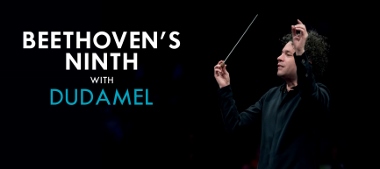LA PHIL’S PRIDE WITH “JOY”
Wow, I do believe tonight’s house at Disney Hall was the most packed for a classical concert that I’ve seen since before that stupid COVID rat showed up. And it’s a sure bet that patrons were here for the massive showing of Beethoven’s Ninth Symphony. Why, with the greatest chorus AND the greatest orchestra in (the world?) this country, how could you go wrong in choosing to attend? Well, you can’t. Fortunately the program — the first half in which we get two glorious world premiere amuse bouches — plays through Sunday, so you have an opportunity to commune with one of the most spectacular movements ever written, the “Ode to Joy.”
The very short first half of the evening was completely understandable given the length of Beethoven’s Ninth, the monster symphony that never fails to impress. And it’s best to experience it in a hall, unlike at the Bowl, where noises compete with massive work. Musicologist’s love love love the Ninth (just say “recapitulation” and their eyes light up), because there’s a musical insight by Beethoven that is almost scientific and mathematical, while being extraordinarily emotional (Beethoven was fully deaf when he wrote it). But not all of it is easily accessible in the way the Fifth and Sixth are. I think, especially, the third movement can be awfully tough to get right. It’s the only movement in the symphony that isn’t so bombastic and rather calm compared with the rest. Certainly there’s beauty in it, but I wish that it weren’t played just this side of languorous, as it was tonight. (Does “Adagio” have to be played, um, “Adagio”?) I was hoping Gustavo Dudamel would offer up something different for this slow-burner, yet it remains hauntingly beautiful at times and mostly contemplative, the music hinting and then warning of more conflict. but that makes no never mind when we arrive at the finale. I suggest you close your eyes and let it sink in. Dudamel held the reins tightly in the first movement, loosening up to convey the buoyant, playful energy of the second movement scherzo; and — regardless of how I feel about it the tempo — offered lovingly shaped phrases in the third.
The final movement sung by chorus and soloists turned into a whirling celebration that caught me up completely. The Los Angeles Master Chorale, solidly prepared by Grant Gershon and assistant conductor Jenny Wong, soared past the challenges of Beethoven’s writing to deliver with the orchestra a ringing affirmation of the human spirit (I change my mind; this is the greatest chorus in the world). The soloists were far and away some of the best I’ve ever heard for the Ninth, and yet one stood out: No bass soloist has sounded more robust, commanding, authoritative, strapping, weighty and dynamic than José Antonio López. His performance was one for the record books. The auditorium positively trembled with this basso profundo and his large, rich, resonant sound; his bottom notes produced full sound and power beyond anything I have ever heard live.
Dudamel, who doesn’t need a score, is extremely demonstrative, more so than usual, perhaps. He is a treasure, displaying a strong sense of musical continuity, confidently and vigorously moving Beethoven’s drama forward with fierce, pile-driving joy. Joseph Pereira’s timpani and Whitney Crockett’s bassoon are wonders, but can we talk about the violists and cellists? Both sections are luscious while digging in enough to scare away the Devil.
Oh, and before you run off to buy tickets, could someone call Steven Spielberg, and tell him we found a composer to score his next Jurassic Park picture: 39-year-old Mexican composer Francisco Cortés-Ãlvarez, whose La Serpiente de Colores (The Multicolored Snake) has its world premiere this weekend. With more packed into 10 minutes than most film scores have in an entire movie, Cortés-Ãlvarez creates an undulating madness and insistent threatening in a jungle-filled landscape with spidery thumping and brassy warnings. Finally, we get to see how these amazing sounds emanate from traditional instruments. Also ridiculously fun and adventurously tribal is Gonzalo Garrido-Lecca’s Esperanza, whose work is the love child of Moncayo and Copeland in three small movements running about eight minutes total. (Both pieces are world premieres and LA Phil commissions.) It has a Western feel that would make Elmer Bernstein proud. I loved it.
Gonzalo GARRIDO-LECCA: Esperanza (world premiere, LA Phil commission)
Francisco CORTÉS-ÃLVAREZ: La Serpiente de Colores (The Multicolored Snake) (world premiere, LA Phil commission)
BEETHOVEN: Symphony No. 9
Los Angeles Philharmonic
Gustavo Dudamel, conductor
Disney Hall : ends on May 29, 2022
for tickets and more events, visit LA Phil

